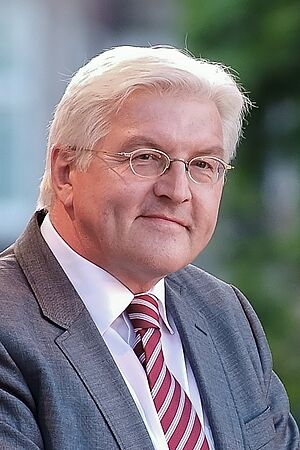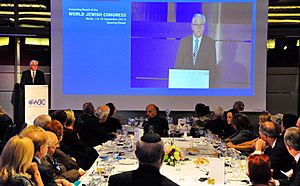Frank-Walter Steinmeier facts for kids
Quick facts for kids
Frank-Walter Steinmeier
|
|||||||||||||||||||||||||||||||||||
|---|---|---|---|---|---|---|---|---|---|---|---|---|---|---|---|---|---|---|---|---|---|---|---|---|---|---|---|---|---|---|---|---|---|---|---|
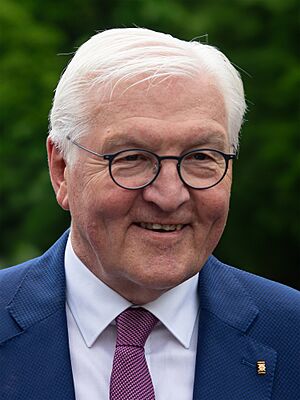
Steinmeier in 2024
|
|||||||||||||||||||||||||||||||||||
| President of Germany | |||||||||||||||||||||||||||||||||||
| Assumed office 19 March 2017 |
|||||||||||||||||||||||||||||||||||
| Chancellor | Angela Merkel Olaf Scholz Friedrich Merz |
||||||||||||||||||||||||||||||||||
| Preceded by | Joachim Gauck | ||||||||||||||||||||||||||||||||||
| Vice Chancellor of Germany | |||||||||||||||||||||||||||||||||||
| In office 21 November 2007 – 27 October 2009 |
|||||||||||||||||||||||||||||||||||
| Chancellor | Angela Merkel | ||||||||||||||||||||||||||||||||||
| Preceded by | Franz Müntefering | ||||||||||||||||||||||||||||||||||
| Succeeded by | Guido Westerwelle | ||||||||||||||||||||||||||||||||||
| Minister of Foreign Affairs | |||||||||||||||||||||||||||||||||||
| In office 17 December 2013 – 27 January 2017 |
|||||||||||||||||||||||||||||||||||
| Chancellor | Angela Merkel | ||||||||||||||||||||||||||||||||||
| Preceded by | Guido Westerwelle | ||||||||||||||||||||||||||||||||||
| Succeeded by | Sigmar Gabriel | ||||||||||||||||||||||||||||||||||
| In office 22 November 2005 – 27 October 2009 |
|||||||||||||||||||||||||||||||||||
| Chancellor | Angela Merkel | ||||||||||||||||||||||||||||||||||
| Preceded by | Joschka Fischer | ||||||||||||||||||||||||||||||||||
| Succeeded by | Guido Westerwelle | ||||||||||||||||||||||||||||||||||
| Leader of the Opposition | |||||||||||||||||||||||||||||||||||
| In office 28 October 2009 – 16 December 2013 |
|||||||||||||||||||||||||||||||||||
| Chancellor | Angela Merkel | ||||||||||||||||||||||||||||||||||
| Preceded by | Guido Westerwelle | ||||||||||||||||||||||||||||||||||
| Succeeded by | Gregor Gysi | ||||||||||||||||||||||||||||||||||
|
|||||||||||||||||||||||||||||||||||
|
|||||||||||||||||||||||||||||||||||
|
|||||||||||||||||||||||||||||||||||
| Personal details | |||||||||||||||||||||||||||||||||||
| Born | 5 January 1956 Detmold, North Rhine-Westphalia, West Germany |
||||||||||||||||||||||||||||||||||
| Political party | Social Democratic | ||||||||||||||||||||||||||||||||||
| Spouses |
Elke Büdenbender
(m. 1995) |
||||||||||||||||||||||||||||||||||
| Children | 1 | ||||||||||||||||||||||||||||||||||
| Alma mater | University of Giessen | ||||||||||||||||||||||||||||||||||
| Signature | |||||||||||||||||||||||||||||||||||
| Military service | |||||||||||||||||||||||||||||||||||
| Branch/service | Bundeswehr | ||||||||||||||||||||||||||||||||||
| Years of service | 1974–1976 | ||||||||||||||||||||||||||||||||||
| Unit | German Air Force | ||||||||||||||||||||||||||||||||||
Frank-Walter Steinmeier (born 5 January 1956) is a German politician. He has been the President of Germany since 2017. Before becoming president, he was the federal minister for foreign affairs from 2005 to 2009 and again from 2013 to 2017. He also served as vice chancellor of Germany from 2007 to 2009.
Steinmeier is a member of the Social Democratic Party of Germany (SPD). He has a doctorate in law and used to work as a civil servant. He was a close helper to Gerhard Schröder when Schröder was a state leader in the 1990s. Later, when Schröder became Chancellor of Germany in 1998, Steinmeier became his chief of staff.
After the 2005 federal election, Steinmeier became the foreign minister in a big government partnership led by Angela Merkel. He also became vice chancellor in 2007. In 2008, he was briefly the acting leader of his party. He ran for chancellor in the 2009 election but his party lost. He then became the leader of the opposition. After the 2013 election, he became foreign minister again. In 2016, he was chosen as the candidate for President of Germany by the main political parties. He was elected president in February 2017 and started his term in March 2017. He was re-elected for a second term in February 2022.
Steinmeier is known for being a moderate politician who likes reforms. As chief of staff, he helped create "Agenda 2010," which were reforms to Germany's welfare system. Some of his policies towards countries like Russia and China have been criticized.
Contents
About Frank-Walter Steinmeier
Early Life and School
Frank-Walter Steinmeier was born in 1956 in Detmold, Germany. His friends call him Frank. His father was a carpenter, and his mother was a refugee from Silesia after World War II.
After finishing high school, Steinmeier served in the military from 1974 to 1976. Then he studied law and political science at the University of Giessen. He finished his law exams in 1982 and 1986. He worked at the university until he earned his doctorate in law in 1991. His special project was about how the government can help prevent people from becoming homeless.
Family Life
Steinmeier is married to Elke Büdenbender and they have one daughter. In 2010, he donated a kidney to his wife to help her.
Hobbies and Interests
Steinmeier enjoys listening to jazz music. He is also a big fan of football.
Early Career in Government
In 1991, Steinmeier started working as an adviser in the government of Lower Saxony. In 1993, he became the director of the personal office for the state's prime minister, Gerhard Schröder. By 1996, he was the Secretary of State and head of the State Chancellery of Lower Saxony.
Political Career in Germany
Working for Chancellor Schröder (1998–2005)
In 1998, after Schröder became Chancellor, Steinmeier was appointed as a junior official in the Chancellor's office. He was also in charge of coordinating Germany's intelligence services. In 1999, he became the head of the Chancellor's office. He was an important adviser to Schröder and helped pass major economic reforms. People sometimes called him "the grey efficiency" because he worked effectively behind the scenes.
In 2003, he supported Schröder's decision to work with Russia and France against the U.S.-led war in Iraq. He also approved sending a German intelligence officer to work with the American commander in Qatar during the Iraq War.
A notable event during his time was the case of Murat Kurnaz, a German-born Turk held at Guantanamo Bay detention camp. Steinmeier stated that Germany had concerns about Kurnaz being a threat. Kurnaz was later released and returned to Germany after Angela Merkel became chancellor.
First Time as Foreign Minister (2005–2009)
In November 2005, Steinmeier became the Foreign Minister of Germany in a government led by Angela Merkel. He was the first SPD foreign minister in many years.
In 2007, he also became the Vice-Chancellor of Germany. He generally worked well with Angela Merkel on foreign policy. However, they sometimes had different ideas, for example, about when German troops should leave Afghanistan. He also supported Turkey joining the European Union, unlike Merkel.
Steinmeier was known for his friendly approach towards Russia. He believed in working closely with Russia, similar to the "Ostpolitik" policy from the 1970s. He helped Russia join the WTO in 2011.
In 2008, he became the first foreign official to meet with Russian President Dmitri Medvedev and Prime Minister Vladimir Putin after they took their new roles.
Leader of the Opposition (2009–2013)
In September 2008, Steinmeier was chosen as the SPD candidate for chancellor in the 2009 federal elections. He also became the acting SPD Chairman. He campaigned for new tax rules and minimum wages.
After his party lost the election, Steinmeier became the leader of the SPD's group in the Bundestag, which made him the leader of the opposition. He often criticized Angela Merkel's government during this time.
Second Time as Foreign Minister (2013–2017)
After the 2013 elections, Steinmeier was appointed foreign minister again in December 2013. He started a big review of Germany's foreign policy, asking many people for their ideas.
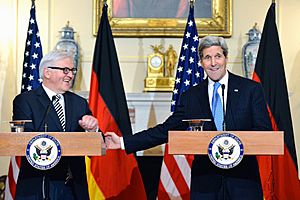
He played a key role in trying to solve the Russo-Ukrainian War. He suggested a bigger role for the OSCE to help with talks in Ukraine. The "Steinmeier formula" became known as part of the Minsk II agreement for a ceasefire. He also hosted meetings in Berlin to discuss the situation in eastern Ukraine.
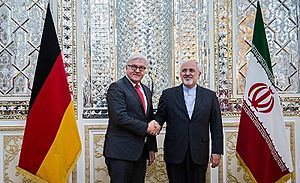
In 2015, Steinmeier helped bring together different groups from Libya to discuss a peace plan. He also helped organize the International Syria Support Group to discuss the conflict in Syria.
Political Views
Human Rights
Steinmeier believes that ending the death penalty is very important for human rights. He has called for it to be abolished in countries like Uzbekistan. He also criticized the large number of death sentences in Egypt in 2014. After a coup attempt in Turkey in 2016, he warned that bringing back the death penalty would stop Turkey from joining the European Union.
European Cooperation
Steinmeier has always supported strong cooperation within Europe. He has worked to strengthen the European Union. He believes that countries should work together to solve problems like the European debt crisis. He also supported finding solutions for Greece's financial issues.
Relations with Other Countries
France
Steinmeier has worked closely with French foreign ministers. They have traveled together on diplomatic missions to various countries.
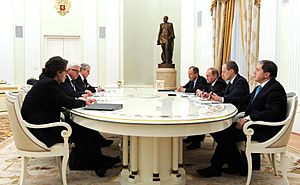
Russia
Steinmeier has often emphasized the need for dialogue with Russia. He believed that excluding Russia from international discussions was not helpful. In 2016, he criticized NATO for what he called "sabre-rattling" towards Russia.
United States
Steinmeier supported Barack Obama during his presidential campaign. In 2016, he called then-candidate Donald Trump a "hate preacher." After Trump's election, Steinmeier was critical of his views.
Middle East
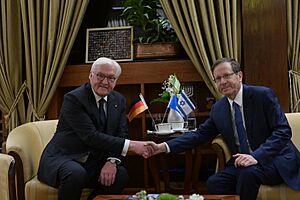
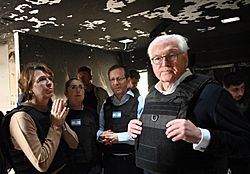
In the Israeli–Palestinian conflict, Steinmeier supports a two-state solution. He believes that both Israelis and Palestinians should have their own states. He has said that Israeli settlements make peace harder to achieve. He also supported Israel during the Gaza war and asked Arabs in Germany to distance themselves from Hamas.
Steinmeier visited Iran in 2015, the first German foreign minister to do so in 12 years. He saw the nuclear agreement with Iran as a chance for more diplomacy in the Middle East.
He has also visited refugee camps in Jordan to understand the situation of Syrians fleeing the war. He agreed that Germany should help destroy Syria's chemical weapons.
Greece
In 2015, Steinmeier rejected claims from Greece for war reparations from Germany related to World War II. He stated that all such issues had been legally settled.
Namibia
In February 2024, Steinmeier apologized to Namibia for the Herero and Nama genocide that happened between 1904 and 1908. He said it was "high time" for Germany to apologize.
Challenges and Debates
Meeting the Dalai Lama
In 2007, Steinmeier openly criticized Angela Merkel for meeting with the Dalai Lama. He believed such a meeting might not help improve rights in China and Tibet. In 2008, he himself chose not to meet the Dalai Lama, saying it took "a lot of courage not to meet with the Dalai Lama these days."
Murat Kurnaz Case
Steinmeier faced questions about the case of Murat Kurnaz, who was held in Guantanamo Bay Naval Base. There were claims that Steinmeier had refused an offer to bring Kurnaz back to Germany earlier. Steinmeier denied blocking his release.
Armenian Events
During a debate in 2015 about Germany's recognition of the Armenian genocide, Steinmeier was hesitant to support it. He was criticized for his position, especially because of Germany's relationship with Turkey. When the German Bundestag voted in 2016 to recognize the killings of Armenians as a genocide, Steinmeier did not vote for it.
University Work Questions
After the 2013 elections, Steinmeier faced questions about his 1991 university paper. Some people claimed he had copied parts of it without giving credit. Steinmeier denied this and asked his university to check his work. In May 2013, the university found that he had not tried to cheat, but noted some "technical weaknesses" in his citations. They decided not to take away his degree.
Presidency (2017–Present)
Becoming President
When President Joachim Gauck announced he would not run again in 2016, a search began for a new candidate. In November 2016, the main political parties agreed to support Steinmeier for president.
On 12 February 2017, Germany's Federal Convention elected Steinmeier as President on the first try. He received 931 out of 1,260 votes. He officially became President on 19 March 2017.
After the 2017 Election
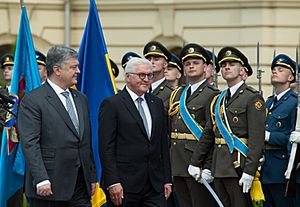
After the federal election in September 2017, political parties tried to form a new government. When talks failed, Steinmeier played an important role. He encouraged parties to continue discussions to avoid new elections. Eventually, the CDU, CSU, and SPD formed a new government.
Presidential Views
In October 2017, Steinmeier visited Vladimir Putin and Mikhail Gorbachev in Moscow. This was the first visit by a German president since 2010.
Second Presidential Term
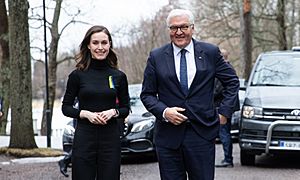
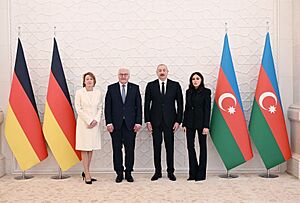
On 13 February 2022, he was re-elected for his second term as president.
Ukraine Situation
After the 2022 Russian invasion of Ukraine, Steinmeier said he regretted his earlier support for the Nord Stream 2 gas pipeline. He called for a trial for war crimes against Russian leaders. In April 2022, he planned to visit Kyiv but was told he would not be welcome. This was seen as a significant rejection. Ukraine had criticized his past connections to Russia.
On 25 October 2022, Steinmeier made an official visit to Ukraine. He spoke about the horrors of the war and warned that "tougher, rough years are ahead of us." In November 2022, he said that a ceasefire at that time would mean Russia would keep the territories it had taken. He condemned Russia's attacks on civilians and power supplies.
Poland Relations
On 1 August 2024, Steinmeier expressed regret to the survivors of the Warsaw Uprising during World War II. He mentioned plans for a monument in Berlin to honor Polish victims of Nazi Germany.
Other Activities
Frank-Walter Steinmeier has been involved in many organizations. These include groups that promote Christian-Jewish cooperation, peace, and organ transplantation.
Awards and Recognition
Steinmeier has received many honors and awards throughout his career. These include honorary doctorates from several universities and various national and international medals.
Some Awards and Honors
- Willy Brandt Prize (2013)
- Honorary citizen of Reims (2015)
- Honorary doctorate from the Hebrew University of Jerusalem (2015)
- Ignatz Bubis Award (2017)
- World Food Programme's Hunger Hero Award (2017)
- Leo Baeck Medal (2021)
- Henry A. Kissinger Prize (2022)
National Honors
- Grand Master of the Order of Merit of the Federal Republic of Germany (since 2017)
Foreign Honors
He has received high honors from many countries, including Austria, Belgium, Denmark, France, Italy, the Netherlands, and Sweden.
See also
 In Spanish: Frank-Walter Steinmeier para niños
In Spanish: Frank-Walter Steinmeier para niños
- List of foreign ministers in 2017
 | James Van Der Zee |
 | Alma Thomas |
 | Ellis Wilson |
 | Margaret Taylor-Burroughs |


